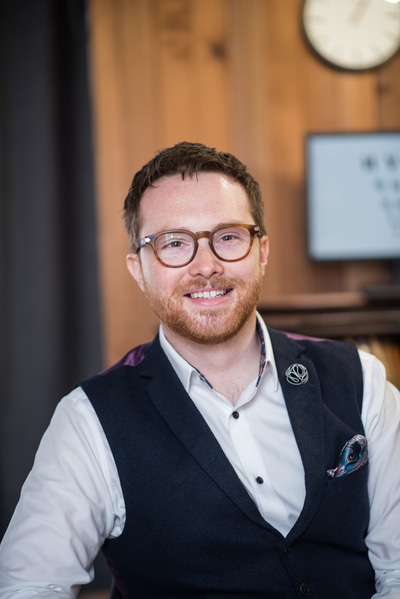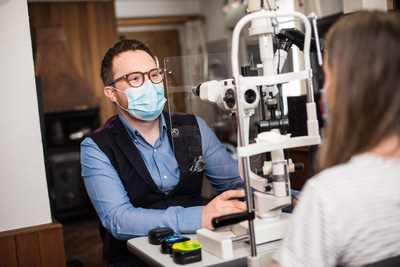- OT
- Life in practice
- Business management
- “You can have a viable business that doesn’t rely on selling glasses”
Becoming a business owner
“You can have a viable business that doesn’t rely on selling glasses”
Dr Christian French opened his eponymous practice, which focuses entirely on clinical eye examinations, in December 2020

03 December 2021
Optometrist Dr Christian French, from Leicester, made the decision to open a practice to focus solely on the clinical side of optometry at the end of last year.
French explains that the idea “was born during the pandemic,” after he bought his own equipment in order to carry out research at the University of Hertfordshire, where he works as a senior lecturer. Whilst buying equipment, conversations with family and colleagues made him realise that setting up his own practice as a side project was a real possibility. At the same time, his locum hours at an independent that he had been working at one Saturday a month, and where he had a loyal, long-term patient base, were cut. Then, an opportunity to set up in a building he already knew fell into his lap when his brother moved out of a cottage owned by their parents. The coincidence seemed too fortuitous to ignore. “Within a couple of months,” French said, “I’d got all the kit and was ready to go.”
French knew early on that he would focus entirely on the clinical aspect of optometry, which was a model that he had seen work in other countries. He had also identified earlier in his career that “selling wasn’t for me.”
So far, he has “found it really rewarding. It’s worked and it’s growing. For me, it’s the fact that I’ve proven that it is doable. You can have a viable business model that doesn’t rely on selling glasses.”
It’s about getting people to think away from that traditional view of an opticians having to be on the High Street
Setting up the business

French already owned the essentials: trial lenses and frame, retinoscope and ophthalmoscope, and sourced the rest of his kit gradually via Optical Marketplace and eBay. One huge outlay was his visual field analyser. He said: “I thought, ‘this has to work, because otherwise I’ve got a very expensive ornament. I’ve got to use it.’ Those investments really hit it home.”
He then organised his logo and branding, settling on a traditional look and feel in the manner of an old-style brass plate practice, “and was ready to go.”
French has quickly found that “most people come to me for a second opinion, or for more complex cases that have been referred from other clinicians.”
“The fact that ‘consulting’ is in the name means that people are coming to speak with me, rather than to buy products. I’m hoping that this positioning suggests from the offset that it is slightly different,” he added.
Patients, he believes, feel that what he is telling them is unbiased, because there is no sale at the end of it. He also finds that it is also possible to discuss, and educate patients on, the more ‘taboo’ subjects, such as buying online, without them feeling pressured.
You don’t have a sit-down lesson on what you need to do to open a business
Decisions for the long-term
For the moment, French has made the decision not to take a salary. “I thought, trying to pay myself from this would strangle it before it’s even got off the ground,” he said. “As long as it can pay its way and keep itself going, I’m happy with that for the first few years. Once it’s grown, I can think about making it pay me a wage.”
Borrowing the building has been “a huge help in terms of premises, because renting somewhere on the High Street would be a huge overhead, especially if I was only using it part time as all the equipment needs to stay in situ even if you aren’t testing,” he said.
For those who might be worried about securing a space, he believes “it’s about thinking outside the box. It may be that there’s a clinic, or a dentist or a hairdresser that has got a spare room that you might be able to borrow or pay a small amount for while you're getting started.”
He adds: “I’ve been very fortunate in having this cottage that I can use, but it’s about getting people to think away from that traditional view of an opticians having to be on the High Street.”
The cottage, with its homely, crooked walls and wood panelling, works well and fits the aesthetic of the business. “As it grows,” French said, “I can look at finding some premises. But I think I need to be mindful that when I do move on, I need to retain that feel.” Patients, he thinks, appreciate it.
Finding a balance
French also works at Kettering General Hospital in eye casualty and paediatrics, alongside the practice and his academic work. Was he nervous about taking on such a task and balancing it with his other commitments, as a first-time business-owner?
The answer is yes, particularly as he is now also increasing his days at the hospital. He has planned his workload carefully, though, working “on an appointment only basis, because while I was setting up I didn’t want to cut a day out of my salary and then be sat twiddling my thumbs with maybe one patient booking in.” For now, he’s focusing on evening and weekend appointments.

In order to keep a good working relationship with the other practices in his local area, and to heighten the chance of referrals, French proactively reached out to explain the aims of his new practice. “I made a point of introducing myself and explaining the business model,” he said. “There has been lots of support. I’ve had referrals from clinicians across the network. It has been really encouraging.”
He adds: “The model allows me to take the time and investigate things, particularly binocular vision cases, and I will send the patient – and a report – back to their original optometrist afterwards.”
This was also important in ensuring that his patients would have a positive dispensing experience elsewhere. “I need to trust that my patients can get dispensed to the same clinical standard as I’ve examined them at,” French said. “I spend ages going through things. I want that to be carried through wherever they go to get glasses.” The other local practices, he emphasises, need to trust the refractions that he’s handing out, and that “they’re not going to be picking up loads of remakes. There’s got to be trust on both sides.”
Looking ahead
Does he see the practice overtaking his hospital and university work and becoming his main project in the future?
French doesn’t anticipate it ever becoming his full-time job, purely because he values the day-to-day variety that he currently has. “I like the academic environment, the lecturing and research, and taking that forward,” he said. “The hospital offers a different slant; it’s clinically challenging. The practice is nice because as I see it it’s pure optometry, doing what optometrists should be doing.”
What would French say to other practice owners who might want to move away from a reliance on selling glasses?
“You don’t have a sit-down lesson on what you need to do to open a business,” he said. “Even now I occasionally think, ‘have I missed something? Is there a bill I forgot to pay or some policy I didn’t know about?’ It’s about speaking with other practice owners and building a support network. It’s a new skill.”
But, he added: “It’s really worth doing. It’s so rewarding. It’s what you’ve trained to do. I’m not a sales person, and I don’t think many clinicians are. Conversion rate-driven bonus schemes are shameful and a real blight on our profession. I’m really pleased that my practice has worked as a model because it does show that it’s possible. And I think people will be very surprised that the public are actually a lot more on board with it than you might expect.”
Advertisement


Comments (2)
You must be logged in to join the discussion. Log in
Don Williams09 December 2021
I opened a non-high street, non-GOS, non retail practice in October 2017. I don’t sell any glasses, no soft lenses and don’t see any peadiatric patients. I rarely do a routine eye examination. All I do day in an day out is see patients with problems. It is purely a clinical/medical practice based in a medical building with other clinicians such as dermatologists, Orthopeadics, etc. I believe that this is the way forward for Optoms. As mentioned in this article, you don’t have to sell glasses and you don’t have to be on the high street to have a viable business. My practice has grown exponentially over the past 2 years. So well done Christian. It would all be worthwhile. Welcome to the club👍🏻
Report Like 937
Anonymous07 December 2021
Or think outside the box..... by running your optometry consulting business and allow other complementary health and beauty businesses (hairdresser, beauty clinic ...to use your facilities. Maybe one of which could be a dispensing only practice :)
Report Like 315